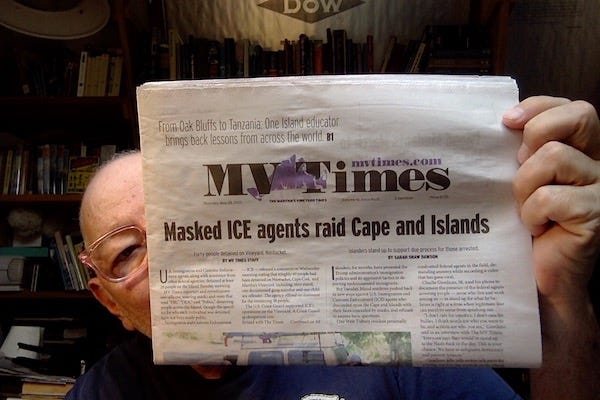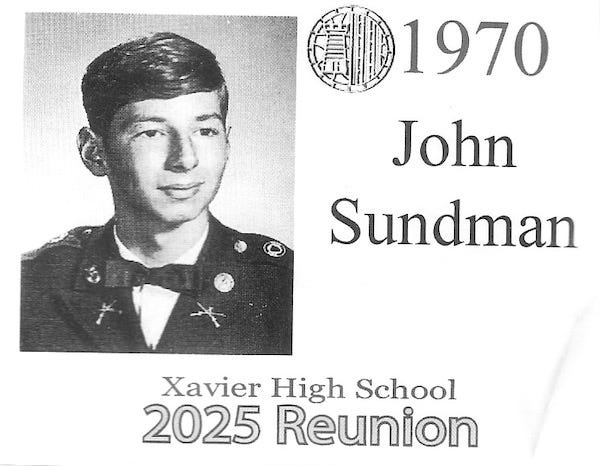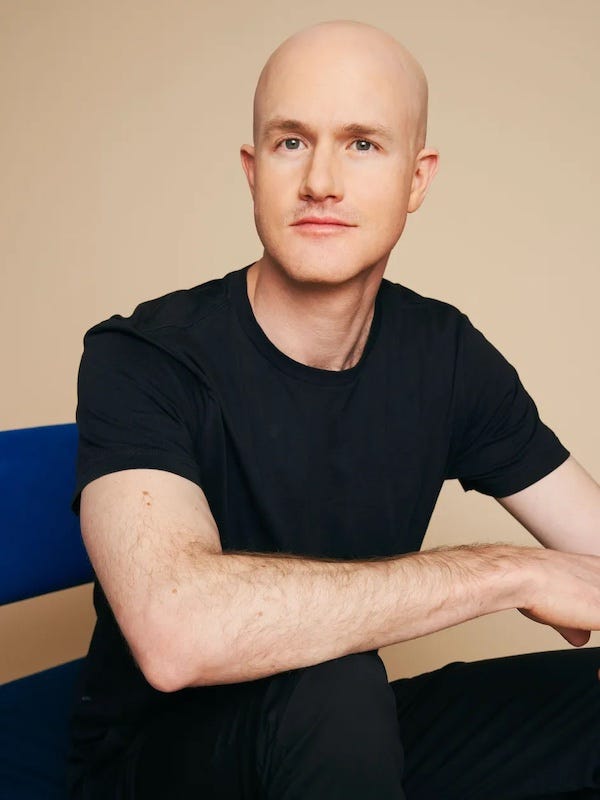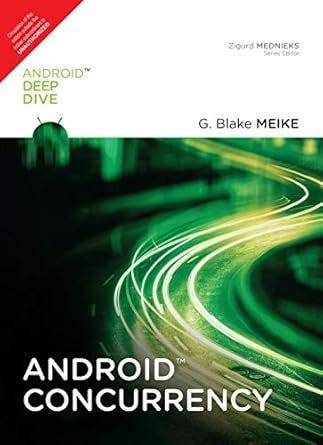Cryptobros & crispr babies, Jaws, parades, misunderstandings & a precious moment on a roof at the edge of a vast desert
Getting unstuck in time as the long day wanes
Welcome, new readers
Sundman figures it out! is an autobiographical meditation, in the spirit of Michel de Montaigne, of a 71 72 year old guy who lives with his wife in a falling-down house on a dirt road on Martha’s Vineyard that dead-ends into a nature preserve.
Incidents, preoccupations, themes and hobbyhorses appear, fade, reappear and ramify at irregular intervals. If you like this essay I suggest checking out a few from the archives. These things are all interconnected.
Précis
Recently this headline from MIT Technology Review caught my attention:
Crypto billionaire Brian Armstrong is ready to invest in CRISPR baby tech
The stigmatized idea could get a massive boost from “tech bros”—and some scientists are cheering them on.
As was said to me once (with regard to an entirely different phenomenon) when I was working in a spare parts warehouse near Place d’Italie, in Paris, France, back when I was 19 years old and dinosaurs walked the earth, ça saute aux yieux comme une epine dans le cul.1
That little gem (above) from the Technology Review mentions at least five of my hobbyhorses: crypto; techbros & Silicon Valley culture; CRISPR & (implied) eugenics; oligarchically-funded science, technopotheosis. Not to mention that the word ‘stigmatized’ alludes to the phenomenon of stigmata2, a variant of which (which I invented) is the subject of my novella The Pains.
Summer of 2025 is the 50th anniversary of the Summer of Jaws. And if you live on the island of Martha’s Vineyard, as I do, where Jaws was filmed, that anniversary is omnipresent and unavoidable.
The Trumpist/Nazi/MAGA beast is no longer trying to hide its hideous face. Today, as I write this post, that beast is stomping like Godzilla through the streets of Los Angeles, in the halls of academe and places of learning, in every medical research laboratory in the land, and anywhere it can find decency, joy, curiosity and compassion upon which it can shit.

All around the globe, empires seem to be in flux. I am trying to make sense of that, and of time.
This essay hops around these themes and others. It is even more squirrelly than a typical squirrelly Sundman figures it out! essay. As Abraham Lincoln may or may not have said in another context, People who like that kind of thing will find that this is the kind of thing they like.
If this essay sounds like the kind of thing you might like, welcome, read on. If not, cheerio, & I hope to catch you some other time.
An encounter with one of New York’s Finest on the Lower East Side
As longtime readers of Sundman figures it out! know well, from spring, 1974 through spring, 1976, my primary residence was a 10’ by 10’ mud hut with a thatched roof in the small village of Fanaye Dieri in Senegal, west Africa, far from electricity or running water, during a time of famine, pestilence and drought. When I arrived back in the States I was an emotional and physical wreck. I’ve written several SFIO! essays about that time, starting with The dark side of the hut, 50 years later.
A couple of months after my return from two years in Africa I borrowed my father’s car and drove into NYC to meet a friend for lunch at a kosher dairy joint3 somewhere around 9th or 10th street. I parked at a meter.
Upon emerging from the restaurant an hour later I saw a policeman putting a parking ticket on my windshield. I jogged towards him, calling out “Officer! I’m just five minutes over the limit. I’m moving it now. Can you give me a break, please?”
The cop didn’t look up. “For you, Sundman,” he said, “fine is doubled.”
A joyful day in Philadelphia
We all noted with interest this press release from Children’s Hospital in Philadelphia a few short weeks ago:
News Release
World's First Patient Treated with Personalized CRISPR Gene Editing Therapy at Children’s Hospital of Philadelphia
May 15, 2025
In a historic medical breakthrough, a child diagnosed with a rare genetic disorder has been successfully treated with a customized CRISPR gene editing therapy by a team at Children’s Hospital of Philadelphia (CHOP) and Penn Medicine. The infant, KJ, was born with a rare metabolic disease known as severe carbamoyl phosphate synthetase 1 (CPS1) deficiency. After spending the first several months of his life in the hospital, on a very restrictive diet, KJ received the first dose of his bespoke therapy in February 2025 between six and seven months of age. The treatment was administered safely, and he is now growing well and thriving.
Yes, there are some troubling specters trying to impinge on the joy that this miraculous cure has brought to KJ’s family and to the medical/scientific team who treated him. But as the father of a son born with a disease that has tormented him for the last 40 years, just as the demon Pazuzu tormented innocent Regan MacNeil in The Exorcist, a disease with no such miracle cure in sight, I will hold off mentioning those specters for at least another paragraph or two.
I send my best wishes to KJ and his family. May their joy and relief be multiplied ten thousand times by families all over the world in the years to come. Amen.
Unstuck in time
I was chatting by email recently with “Joe,” a longtime friend and supporter of my various writing projects. I was telling him about a recent online conversation I’d been having with another longtime friend, “Harvey,” who is not much of a fan of my writing — especially not of these SFIO! essays. Harvey doesn’t object to kinds of things I write about, per se, but to the way I write about them.
I wrote to Joe of Harvey’s ‘insistence that my style of writing is wrong: stylistically, financially, morally; that my long sentences (full of subordinate clauses and parenthetical remarks) — not to mention all the asynchronous jumping about between stories and themes and so forth — are an affront to all decent people (he didn't say it exactly like that, but that seemed to me to be the gist of his argument).’
To expound Harvey’s reasoning, as I understand it, these SFIO! essays are ‘wrong’4
stylistically, because they’re cloying and self-indulgent;
financially, because I could find a much bigger audience and make more money if I would just cut out all this fancy-pants shit;
morally; because I’m wasting people’s time.
To which Joe replied that he emphatically disagreed with Harvey. He closed with some complimentary words, including these:
“I, quite honestly, cannot think of anything I could possibly say, after one of your John Sundman has come unstuck in time essays, that could, in any way add to it.”
That ‘unstuck in time’ phrase is a flattering allusion to Kurt Vonnegut’s novel Slaughterhouse Five, where it originated.
Wikipedia:
Slaughterhouse-Five, or, The Children's Crusade: A Duty-Dance with Death is a 1969 semi-autobiographic science fiction-infused anti-war novel by Kurt Vonnegut. It follows the life experiences of Billy Pilgrim, from his early years, to his time as an American soldier and chaplain's assistant during World War II, to the post-war years. Throughout the novel, Billy frequently travels back and forth through time. The protagonist deals with a temporal crisis as a result of his post-war psychological trauma. The text centers on Billy's capture by the German Army and his survival of the Allied firebombing of Dresden as a prisoner of war, an experience that Vonnegut endured as an American serviceman. The work has been called an example of "unmatched moral clarity" and "one of the most enduring anti-war novels of all time".
Specters at the hospital door
From my novel Acts of the Apostles, which I published in 1999, which concerns a Silicon Valley billionaire and his cult of techbois whose oligarchically-funded research produces a very Crispr-like technology:
As soon as Pavel and Dieter perfected the design and refined the manu-
facturing process, their machine would be able to change any one DNA
sequence into any other DNA sequence. With this capability the age of
the new alchemy would truly begin. With this technology all things would
become mutable: oil spill would become fish food, smog would become clear
air, the cystic fibrosis gene would become sound. Imagine: the dying child
lies on the hospital bed, a simple injection into his blood, and lo, behold the
child arise and walk.
But of course the tech-bro’s interests in the DNA-editing technology lies elsewhere, as some critics anticipate.
From later in the novel, here’s a conversation between ‘Dieter’ and ‘Judith,’ a molecular biologist, who — like Jennifer Daudna the American biochemist and Nobel laureate known for her work on Crispr gene editing and other fundamental contributions in biochemistry and genetics — has reservations about the uses to which such technology might be used:
“Dieter, this is very, very dangerous work. I am sure that you can see
that.”“If you mean that there exists the possibility for misuse of this technology, certainly you are right. But that is true of any science, of any technology. Steel can be used to make surgeons’ scalpels or, what do you call them, dumdum bullets. Fertilizer can be used to grow crops or to make terrorist bombs. Computers can be used to explore the ocean bottom or to manipulate the stock market. It is up to society to determine how technology is put to use, not up to the scientist.”
“That is certainly a common argument, and a convenient one. But some-
times it begs important questions. It took the scientists of the Manhattan
Project two years to invent an atom bomb, and yet fifty years later Iraq can-
not do it; they must seek to buy their bombs elsewhere. What would the
world be like if atom bombs were not so difficult to make, if you could get
one as easily as you can buy a toothbrush? What moral burdens would rest
on the shoulders of those first bomb-makers? Your work is perhaps as much
in advance of the world. If you stopped working now, it might be fifty years
until some other team reached the stage that you are now at. Fifty years is a
long time. I would rather take fifty years to get ready, to think through what
we are about, than to go ahead and make something dangerous now, just
because we know how to make it.”“So my work is like a Manhattan Project, an atom bomb? I was under the impression I was working on a universal medicine, a cure for Cystic Fibrosis and cancer,” he said.
“Of course it could be used for that, and I am sure that is your intent. But you cannot escape the fact that this technology could also be used for
biological warfare of the most sophisticated, the most evil kind. Assume
you succeed in making your device, your nanomachine. You could release
these—” she hesitated, looking for a word— “these things in the air, and they
could be programmed to seek out people who had a certain gene, say, a gene
for blond hair. When they find that gene they change it to the ‘right’ gene. Or they launch another program to kill the ‘defective’ person who has that
gene. These machines would be so small that they could pass through any gas
mask. They would be virtually undetectable. And if they were enclosed in a
sixty-carbon, flexible-diamond shell, they would be virtually indestructible. There would be no way to stop them.”
All of my books, starting with Acts of the Apostles, concern techno-utopian Silicon Valley overlords (like Brian Armstrong and Marc Andreesen and Larry Ellison and Peter Thiel), and the nefarious things they plan for us with technologies like Crispr, brain-hacking nanobots, AIs, and pan-surveillance.
My books are all disturbingly prescient. Though written as many as twenty five years ago, they’re good guides to what’s going on all around us today. They frankly scare the crap out of me, and I wrote them. Please buy and read them. (Yes, that is a link to dread amzn, which I abhor. I’m earnestly working to get off it. But for now, as Willy Sutton famously never said, That’s where the money is.)
Parades (1)
Speaking of getting unstuck in time, since the last time I posted an essay here, this happened:
As I wrote in my essay Catholicism and Human Sexual Response, after having grown up on a small farm in New Jersey and having attended public schools, to which I walked, through 8th grade, in the fall of 1966, as the war in Vietnam raged far away and antiwar protests became larger and more intense across the USA, I found myself wearing a military uniform and commuting by bus, train and subway, to Jesuit/ROTC Xavier High School on 16th Street, near the northern edge of Greenwich Village, Manhattan.
At Xavier, every Monday or Tuesday afternoon after school (according to which battalion we had been assigned) we would walk 10 blocks north and 2 east to the 69th Regiment Armory, where we would practice close-order drill. Wikipedia:
Close order drill refers to the formal movements and formations used in marching, parades, and ceremonies, where soldiers are arranged closely together to maintain discipline and precision. It is a traditional military practice that emphasizes order and uniformity among troops.
On feast days of the Catholic Church, ‘the Regiment’ would march out the front door of the school and proceed 100 yards west on 16th Street (which the City of New York graciously closed to traffic for half an hour), where we would execute a ‘column left; march!’ up the steps of the Church of St. Francis Xavier to attend holy mass. We also marched in New York City’s St. Patrick’s Day parade.
At the Xavier High School reunion this past May 31st I caught up with guys I had not seen for fifty-five years.
That ‘cryptobro/crispr-baby thing
Doesn’t this guy just look like a crypto billionaire who would be interested in life extension, private city-states, transhumanism and the genetic engineering of human embryos and also be indifferent to the continued existence of the United States of America? Doesn’t he look like a guy who would curry favor with the would-be tinpot dictator Trump by paying for a parade by the Army of the United States of America on the would-be tinpot dictator’s birthday? Because that’s what he is.
Armstrong, the founder and CEO of Coinbase — an exchange where people who promise that they’re not criminals can change Bitcoin and other so-called cryptocurrencies into what Armstrong & his tribe call ‘fiat,’ and which you and I call ‘money’ — is, as you would expect, a walking, talking techno-libertarian Silicon Valley cliché. For good or ill, these guys have become my bread & butter.
Yesterday in Washington, DC, there occurred a parade of sorts, about which, more below. According to signage, this parade was ‘brought to [us] by Coinbase.’
Summer reading, 1975
In the summer of 1975 I was blissfully unaware of the Jaws craze that was sweeping the USA. But on one of my periodic 2-day hitchhiking trips to Podor to collect my mail (as described in that Dark Side of the Hut essay) I found in my post-office box a book (which looked just like the one below) that had been mailed to me by my Aunt Marie (whose son, my cousin Christian, not only introduced me to his one-time high school roommate George Church (whose name appears a lot in these digressive chronicles) but is also a paying subscriber to Sundman figures it out!, Fred bless him. Hi Chris!
In a post Xavier-reunion fit of nostalgia I purchased a used copy of book that I remember reading on one of those excursions to Podor: Anthony Burgess’s The Long Day Ways, a bittersweet trilogy about the sad last days of a fading colonial outpost, which I’ve been rereading with delight:
‘Joe’ explains the illusion of time
When I mentioned my conversation with ‘Joe,’ above, I was being unduly coy about his identity. ‘Joe’ is G. Blake Meike, the author of Android Concurrency, a book aimed at developers of apps that run on your android phone:
Although Blake’s book is intended for advanced computer programmers, of which I am not one, the concepts in it are surprisingly germane to our present inquiry; germane, indeed, to the whole Sundman figures it out! undertaking.
From the text:
"The purpose of the discussion, up to this point, has been to reframe the idea of concurrency. Concurrency is not a way to make a program run faster. It is not a complex juggling trick that ninja coders use to keep multiple balls in the air at one time. On the contrary, it is the apparent sequential execution of a program that is the complex trick. Sequential execution is an illusion maintained by a cabal of compiler writers and hardware architects. Concurrency is simply the relaxation of a fabricated constraint. In the developer’s environment, where time and order are rigid and implicit constraints, “concurrency” is just another word for “order unspecified”."
I think that perhaps I should start calling these investigations of mine ‘order unspecified.’ Yes? No? Maybe so?
"I tried to read one of those Sundman things," he said to the people around the table. "Sheesh. I thought I was on drugs. I had to go take a nap! And that was after reading only the first 3 sentences!"
A misunderstanding
On the aforementioned hitchhiking expedition from the village of Fanaye to collect my mail in Podor, I caught a ride as far as place where the unpaved road to Podor turned off the (2-lane blacktop) ‘national highway’ that parallels the Senegal River from St. Louis to Kaedi. There I sat myself down in the shade of a neem tree and withdrew from my striped-cotton traveling bag my copy of The Long Day Wanes, a bottle of water, and an orange5, and began my wait for whatever car might come and give me a ride.
As I sat there reading, eating an orange, I looked up and saw, about 20 feet away, a few small monkeys eying me curiously. It was the first time I had ever seen any monkeys outside of a zoo.6
I thought they might like a snack, so I withdrew another orange from my bag and rolled it towards them.
Son of a gun if the lead monkey didn’t pick up that orange and throw it right back at me. Sometimes, I find, my gestures of kindness are misinterpreted.
Parades (2)
This time yesterday I was down at Five Corners on Martha’s Vineyard for the No Kings demonstration. It was the largest gathering I've ever seen here. All ages, lots of signs & US flags, in a steady rain. Much laughing & smiling. 5 Corners is the busiest intersection on the island & 9 of 10 cars honked approval as they slowly drove past. I estimate 1k+ people were participating ( of an island population ~20k).
There's a large immigrant population here. Four in ten kids in our schools speak language other than English at home — mostly Brazilian Portuguese. Masked ICE goons raided 2 weeks ago, kidnapping several, and there is much fear in the community. There were many "WE SUPPORT IMMIGRANTS" signs yesterday. Not many Brazilians were in the crowd, but who can blame them?
5 Corners abuts the parking lot for the post office. A one point a pickup truck with a giant TRUMP banner stretched across the hood pulled into the lot. I burst out laughing. Couldn't help myself: I pointed at the driver & gave him the universal thumb/middle-finger circle 'jerk-off' salute. I wonder if he was disappointed that I didn’t get all huffy and give him the finger.
Meanwhile in Washington, DC, the Trump parade spectacle was going on.
On Bluesky yesterday evening people had posted video clips of a very unimpressive parade with sparse crowds in attendance. One such clips showed a bunch of soldiers kind of in formation, wearing fatigues, moving along to the recorded sounds of Creedence Clearwater Revival’s “Fortunate Son,” of all improbable songs.
To which I commented:
These soldiers aren't marching, they're walking. Which is fine with me — on the assumption that they're better at doing more important things. I attended a military (JROTC) high school, and if we ever marched as sloppily as these guys we'd be doing drills on Saturday as punishment.
A theme emerged in the comments: “This was the Ishtar of military parades.” “This was the Four Seasons Total Landscaping of military parades.”
My contribution, “This was the Cue Cat of military parades,” has become my most -loved skeet in nearly 3 years on the Bluesky platform.
About the cop who put the parking ticket on my car near the kosher restaurant in spring, 1976
It was Pat Doyle, one of my best high school buddies, who had become an NYC flatfoot. It's important to understand that Doyle didn't look up when I asked him (i.e. the cop) to cut me a break about the parking ticket. He and I graduated in the class of 1970. So this was six years since we had last seen each other, and he instantly recognized me by my voice & made that deadpan reply.
He was at the Xavier reunion last month. During dinner we sat at the same table. Pat is extremely friendly, a textbook 'laughing Irishman.' But, like my friend Harvey, Pat Doyle, the retired NYC cop — the old dinosaur kind of cop, the guy who used to walk his beat and knew everybody in the neighborhood — is not exactly a fan of my technopotheistic ramblings.
"I tried to read one of those Sundman things," he said to the people around the table. "Sheesh. I thought I was on drugs. I had to go take a nap! And that was after reading only the first 3 sentences."
About the parking ticket incident he said, “I should have tripled it.”
On a roof near the old French fort
I’m nearing substack’s ‘email length limit’ so I’ll omit photos of the dusty town of Podor, unstuck in time, with its 200 year old French fort still holding silent sentry over the river. It’s easy enough for you to search for photos and I hope you will, because that will help you better understand the order-unspecified story I’m trying to tell here.
The whole feeling of the place, when I was there fifty years ago, was like being in a bittersweet novel about the last days of a fading colonial outpost.
On the other side of the Senegal river, of course, not very far to the north, lies Mauritania, where the Sahel gives way to the Sahara, a desert as vast as the continental United States.
Anyway after the incident with the monkeys and the orange I got to Podor and collected my mail, then made my way to the house of my friend Richard, a Peace Corps Volunteer who taught in the high school, the only such institution for 70 miles in any direction. Richard’s house was a drab, cement thing with worn green wooden shutters that could be closed in the event of a sandstorm. Like everywhere else in Podor that had electricity, Richard’s house only had it a few hours each day, and sometimes not even then. His refrigerator, which kept things only a few degrees cooler than lukewarm, was kerosene-powered.
As the sun set we grabbed a couple of bottles of lukewarmish Stork beer and Richard’s battery-powered shortwave radio and headed up cement stairs to the flat roof, where there were two chairs that faced west, away from the river, over the wide flood plain of the river. The sun glowed orange in the dusty haze.
Drums sounded reassuringly in the distance — always drums in Futa Tooro, always — and a cowbell tinkled on one of the few cows not yet lost to the drought as it sauntered homeward. Goats bleated as they were herded from here to there. And then came, from the mosque, the call to evening prayer.
As the beer — the first I’d tasted since my last mail run — entered my bloodstream, a slight breeze came up and a feeling of great calm and wonder came over me. I felt that I was where I was meant to be, sitting on this warm roof near a river on the edge of a desert in Africa. Neither Richard nor I spoke for quite a while.
Then, over the shortwave, courtesy of BBC World Service or some such, came the lilting orchestral introduction to The Three Degrees singing When Will I See You Again?, followed by the plaintive, yet oddly erotic, singing of a trio of female voices that echoed the muezzin’s call to prayer:
Oooo! Ahhh! Precious moments!
I love how, in the image above, the three Black American singers, the Three Degrees, look like they could be Halpular’en: their faces are narrower and not quite as dark as the typical Wolof people of Senegal. Even their gowns and headdresses look somewhat Halpularish.
Those of you who’ve read my Jerrycans full of gasoline in the back seat essay can guess who I was probably thinking about.
When will I see you again? When will we share precious moments? Will I have to wait forever? Will I have to suffer? (Suffer) And cry the whole night through? When will I see you again? When will our hearts beat together? Are we in love or just friends? Is this my beginning or is this the end? When will I see you again? When will I see you again? When will I see you again?
It made me wonder if, two hundred years earlier, some homesick, lovestruck French Legionnaire garrisoning that old fort on the river on the edge of the Sahara had experienced similar thoughts.
Passing the collection plate
I’m just a poor writer who’s trying, and not always succeeding, to make enough dough to pay his mortgage & car payments on time. If you, like ‘Joe,’ enjoy my kind of writing and would like to help out, please consider upgrading to a paid subscription. If you’d just like to make a one time-contribution, here’s a link to buy me a coffee (any amount welcome — pay no attention to the exorbitant suggestions).
I had 2 dozen other things I was going to say about all this but again I’ve spent way, way, way too much time on this essay already, and besides, I’m out of room.
Cheerio!
For those who’ve forgotten their 8th-grade French and can’t be bothered to ask Mother Internet to translate, here’s how google renders it: “It jumps to the eyes like a thorn in the ass.”
Stigmata (Ancient Greek: στίγματα, plural of στίγμα stigma, 'mark, spot, brand'), in Catholicism, are bodily wounds, scars and pain which appear in locations corresponding to the crucifixion wounds of Jesus Christ: the hands, wrists, feet, near the heart, the head (from the crown of thorns), and back (from carrying the cross and scourging).
Why two gentiles were exploring kashrut is a story for another time.
This consideration of ‘wrongness’ reminds me of a story involving my wife Betty, Jane Curtin (both in her capacity as herself, and as a character she played on a TV show in the 1980’s), and chicken cacciatore. That story, alas, will also have to wait for some other time.
Oranges were not available to purchase in Fanaye or anywhere near it. I have no recollection of how I came to be in possession of those oranges. All I know is that I had a few, and that I rolled one to the monkeys.
There were no monkeys in Fanaye, although the Pulaar word ‘sookahbay’ — ‘monkeys’ was used to refer to children, as some of us English-speakers use the word for young goats, i.e. ‘kids,’ to refer to children.










Have just put Burgess: Long Day Wanes on my reading list.
I see you a Slaughterhouse Five and raise you a Tristram Shandy (what Sterne says here about historiographer and history applies to storyteller and story) – sorry if Iʼve sent before:
Could a historiographer drive on his history, as a muleteer drives on his mule,—straight forward;—for instance, from Rome all the way to Loretto, without ever once turning his head aside, either to the right hand or to the left,—he might venture to foretell you to an hour when he should get to his journey's end;—but the thing is, morally speaking, impossible: For, if he is a man of the least spirit, he will have fifty deviations from a straight line to make with this or that party as he goes along, which he can no ways avoid. He will have views and prospects to himself perpetually soliciting his eye, which he can no more help standing still to look at than he can fly.
Boo, Harvey, you can't recognize originality and style! John is one of a kind.
Podor and its fort are hauntingly beautiful, under the dark blue African sky.